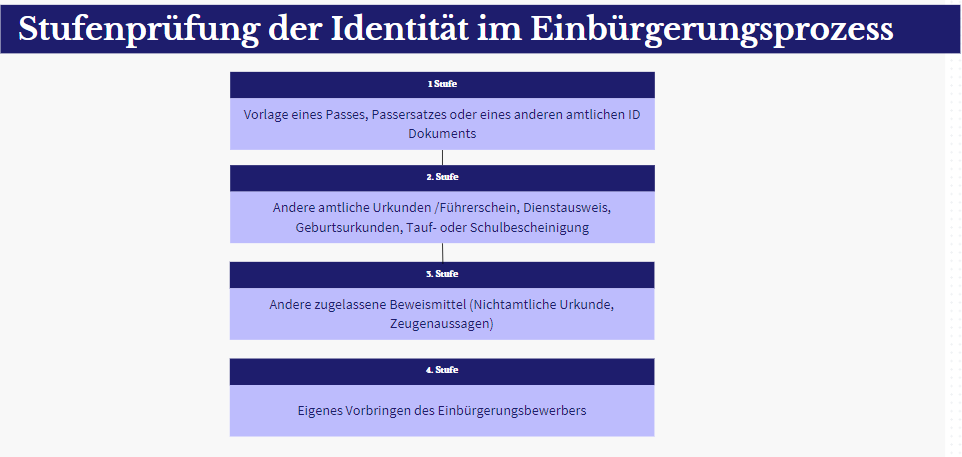Administrative Court of Hamburg, January 17, 2024, Case No.: 19 K 1924/23
Facts of the Case:
The plaintiff was from Eritrea and sought naturalization.
The plaintiff sought his naturalization into the German citizenship. According to his own statements, the plaintiff was born in Eritrea and is an Eritrean national. He held a residence permit under Section 25(2) of the Residence Act (AufenthG). By letter dated December 1, 2023, the plaintiff applied for naturalization into German citizenship pursuant to Section 10(1), (3) Sentence 1 of the Nationality Act (StAG) (so-called entitlement to naturalization).
As proof of identity, the plaintiff submitted his baptismal certificate and his travel document for refugees.
Under Section 10(1) Sentence 1 of the Nationality Act (StAG), a foreigner must be naturalized if, among other things, their identity and nationality are clarified. This is generally difficult for Eritrean nationals. On January 17, 2023, the plaintiff submitted the completed application form. To prove his identity, the plaintiff attached a copy of a „Certificate of Baptism“ from the Catholic Eparchy of Segeneity, Eritrea, as well as a copy of his travel document for refugees.
After several months, the plaintiff filed a lawsuit for inaction.
On May 5, 2023, the plaintiff filed the present lawsuit, pointing out that he had submitted all necessary documents to the defendant and that the requirements for naturalization under Section 10(1), (3) Sentence 1 StAG were met, yet the defendant had not decided on the application despite the deadline set forth in Section 75 Sentence 2 of the Administrative Court Procedure Act (VwGO). The plaintiff argued that the submission of the baptismal certificate was sufficient proof of identity. He had no other documents available and could not reasonably obtain them. Obtaining an Eritrean passport was subject to unreasonable conditions, including the requirement to submit a declaration of repentance, as indicated by the Federal Administrative Court’s decision of October 11, 2022 (BVerwG 1 C 9.21). Therefore, the second stage of the four-stage model under the Federal Administrative Court’s case law should be applied. At this stage, the submission of the baptismal certificate was deemed sufficient.
Decision of the Administrative Court of Hamburg
VG Hamburg rules against the plaintiff
The Hamburg Administrative Court ruled that the lawsuit was unfounded. The plaintiff has no right to naturalization under Section 10(1), (3) Sentence 1 StAG. The necessary requirement of clarifying the plaintiff’s identity was not met.
Under Section 10(1) Sentence 1 StAG, naturalization requires, among other things, that the foreigner’s identity be clarified. The requirement of identity clarification serves significant security interests of the Federal Republic of Germany.
Proof of identity is assessed according to the so-called four-stage model.

The plaintiff did not prove his identity by presenting a passport, a recognized substitute passport, or another official identity document from his country of origin with a photograph (Stage 1), as he claimed he did not possess such a document.
The travel document for refugees submitted by the plaintiff does not meet this requirement. It does not have binding effect regarding the stated personal details.
The plaintiff was denied proof of identity at Stage 2. Based on the principles outlined above, a transition from Stage 1 (submission of identity documents or other official records) to the subsequent Stage 2 (other evidence) is not permissible in the plaintiff’s case.
The plaintiff did not sufficiently fulfill his duty to cooperate.
The plaintiff had not complied with his duty to initiate and cooperate at all. He had made no efforts to prove his identity, relying solely on the alleged lack of evidence. He had neither tried to obtain an official certificate of identity by other means (e.g., through authorities in his home country) nor attempted to contact the Eritrean embassy. The plaintiff had not taken any steps to find out what might be possible and necessary in his specific case to obtain identity proof from his country of origin.
He had not initiated anything to clarify his identity. The plaintiff had made no efforts and had not approached anyone to find out anything about obtaining proof of identity. Therefore, he had not done everything possible and reasonable to obtain documents to prove his identity. Consequently, he could not rely on a lack of evidence.
The plaintiff also did not provide specific reasons why it would be unreasonable for him to contact the Eritrean authorities in his home country. Moreover, even for recognized refugees, the clarification of identity and nationality is not waived; this may include, where necessary, a personal appearance by the naturalization applicant at the competent foreign mission, which is a generally objectively justified and therefore reasonable procedural requirement.
Given this background, the plaintiff could not meet the requirements of Stage 2 due to his failure to fulfill his duty to cooperate.
Important Note: The content of this article has been prepared to the best of our knowledge and belief. However, due to the complexity and constant evolution of the subject matter, we must exclude liability and warranty. Important Notice: The content of this article has been created to the best of our knowledge and understanding. However, due to the complexity and constant changes in the subject matter, we must exclude any liability and warranty.
If you need legal advice, please feel free to call us at 0221 - 80187670 or send us an email at or send an email to info@mth-partner.de info@mth-partner.de
Lawyers in Cologne advise and represent clients nationwide in immigration law.



One Response